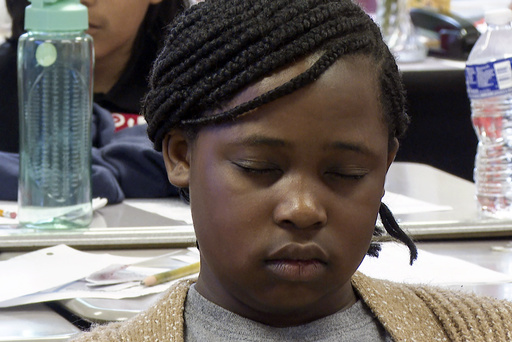In Rex, Georgia, third-grade students at Roberta T. Smith Elementary School engage in mindfulness exercises minutes before lunchtime. Led by their teacher, Kim Franklin, the children participate in activities like the “shark fin” exercise with closed eyes and focused breathing to promote relaxation and emotional regulation.
Schools nationwide have been implementing yoga, meditation, and mindfulness practices to aid students in managing stress and emotions. In light of the mental health challenges exacerbated by the COVID-19 pandemic, the U.S. Centers for Disease Control and Prevention endorsed these initiatives in schools. Research indicates that mindfulness programs in schools, particularly in low-income communities, can be beneficial for students dealing with high levels of stress and trauma.
Smith Elementary School in Clayton County, where the majority of students are Black, introduced its mindfulness program through a partnership with Inner Explorer, supported by the GreenLight Fund Atlanta. Recognizing the importance of providing accessible resources to communities of color, the program aims to support the well-being of students in the Greater Atlanta area.
In response to the emotional toll of pandemic-related disruptions and isolation, the CDC highlighted the prevalence of persistent feelings of sadness and hopelessness among students. Mindfulness practices are recommended by the agency to assist students in managing their emotions and well-being during challenging times.
Despite some political controversy surrounding social-emotional learning, advocates emphasize the significance of prioritizing students’ mental health. Communities of color, including Black children, face unique challenges with mental health, as evidenced by concerning suicide rates among Black youth.
Inner Explorer’s mindfulness program, adopted by schools like Atlanta Public Schools and numerous districts nationwide, guides students and educators through brief sessions of breathing exercises and meditation multiple times a day. Teachers and school administrators have observed positive changes in students’ behavior and emotional regulation after incorporating mindfulness practices into their daily routines.
Students like Aniyah Woods and Malachi Smith have found the mindfulness program helpful in managing stress and connecting with their emotions. Aniyah expressed feeling peaceful, while Malachi shared how the practice helps him relax and recognize his academic abilities. By prioritizing students’ mental well-being and incorporating mindfulness practices into their curriculum, schools aim to create a supportive and inclusive environment for all students.


